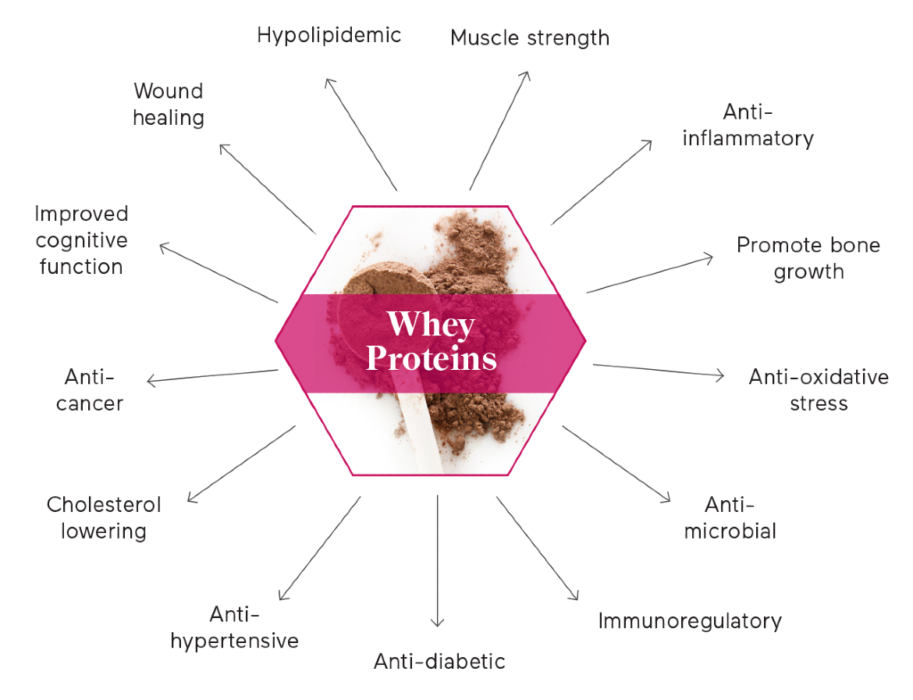Whey Protein & Immunity: Giving Your Body the Strength to Fight

Whey Protein & Immunity: Giving Your Body the Strength to Fight
Nutrition to boost immune system
A well-balanced diet, which includes a variety of fruits, vegetables, and protein, can help increase your immune function. Some countries have issued nutrition guidance for general population and people recovering from viral infections. Health officials have emphasized the importance of adequate intake of dietary proteins. People should consume complete, high-quality proteins (egg, dairy, and soy proteins) in their daily diet. Other important immunity enhancing properties are found in vitamins (Vitamin C, B6 and E), essential fatty acids, and some probiotics.
Role of Whey Protein
Our immune system is made up of proteins. High-quality amino acids in our diet is essential in maintaining immune system cell structure. Whey protein is a well-known, complete protein source that provides all the essential amino acids our body needs. Whey proteins also contain individual proteins such as Lactoferrin and immunoglobulins that have immune-enhancing bioactivity.
Optimize high quality protein intake during one’s catabolic health condition
- Inadequate protein intake can lead to weaker immune function, slower recovery from illness and loss of lean body mass. The need for more dietary protein is in part because of a declining anabolic response to protein intake in a sick population. More protein is also needed to offset inflammatory and catabolic conditions associated with chronic and acute diseases. Evidence shows that higher dietary protein ingestion is beneficial to maintain body functionality and promote recovery in adults who are in catabolic conditions. The catabolic conditions are situations like acute bed-rest, malnutrition, physical inactivity, and virus infections.
- The nutrition guidance for patients infected with Coronavirus (issued by China CDC) recommends patients to take150-200 grams total protein per day (around 1.5-2.0g /kg body weight/day). It is good have protein from milk and dairy products, especially yogurt. The recommendation of how much dietary reference intake (DRI) for the ill to consume for extra support is 1.2- 2.2g/kg/d.
Whey protein strengthens cell anti-oxidation
Whey protein also has potent antioxidant activity because it is rich in the amino acids cysteine and methionine. With a high concentration of these amino acids, immune function is enhanced through intracellular conversion to glutathione (GSH). Glutathione is the center piece of body antioxidant defense system that protects cells against free radical damage, pollution, toxins, and infection. Glutathione levels decrease with age and illness. In comparison to other protein sources, whey has the unique capacity to increase glutathione production that leads to improvements in body health condition.
Figure: Schematic diagram of glutathione (GSH) synthesis following whey protein intake and the most important functions associated with this process
Benefits of whey protein
Bioactive components in whey protein
The biological components of whey, including lactoferrin, beta-lactoglobulin, alpha-lactalbumin, glycomacropeptide, and immunoglobulins, demonstrate a range of immune-enhancing properties.
Alpha-Lactalbumin (α-lac) is the most prevalent whey protein in human milk and makes up 20-25 percent of bovine whey proteins. In a study with rodents, alpha-lactalbumin improved antibody response to infection. Additionally, it has a direct effect on B-lymphocyte function, as well as suppressing T cell-dependent and independent responses.
Glycomacropeptide (GMP/CMP) is a bioactive peptide derived from casein during the cheesemaking process. Research demonstrates that compared with casein or purified amino acid diets, GMP enhances immunomodulatory activities by inhibiting immune cell proliferation and lowering indexes of inflammation. GMP is also shown to exert prebiotic and antibacterial effects from in vitro and in vivo studies.
No one food will magically fend off the disease, but certain nutrients take the lead in helping protect your body from millions of bacteria, viruses and other germs – and protein is one of them. It has been shown whey protein can promote body health, by binding and inactivating bacterial toxins, inhibiting bacterial and viral adhesions, such as E. coli, and strongly promoting growth of good bacteria, such as Bifidobacterium breve and Lactococcus lactis.
The coronavirus epidemic is not going away any time soon. That means continued vigilance for our own health and special vigilance for that of seniors and those with compromised immune systems. What we can do is to tackle the things in our control, like practicing good anti-disease hygiene, and strengthen our immune system and fend off illnesses. We hope you can use this knowledge and these suggestions to be well.
References
- Wong CW, Dennis L. Watson. Immuno-modulatory effects of dietary whey proteins in mice. Journal of Dairy Research. 1995: 62 359-368
- Vijaylaxmi Grey, Shawn R. Mohammed, Argyrios A. Smountas, Rasha Bahlool, Larry C. Lands. Improved glutathione status in young adult patients with cystic fibrosis supplemented with whey protein. Journal of Cystic Fibrosis. 2003: 195-198
- Ng, Tzi Bun, et al. “Antiviral activities of whey proteins.” Applied microbiology and biotechnology 99.17 (2015): 6997-7008.
- Sawin, Emily A., et al. “Glycomacropeptide is a prebiotic that reduces Desulfovibrio bacteria, increases cecal short-chain fatty acids, and is anti-inflammatory in mice.” American Journal of Physiology-Gastrointestinal and Liver Physiology 309.7 (2015): G590-G601.
- Córdova-Dávalos, Laura Elena, Mariela Jiménez, and Eva Salinas. “Glycomacropeptide bioactivity and health: A review highlighting action mechanisms and signaling pathways.” Nutrients 11.3 (2019): 598.
This is for information and education only, and not meant to position Agropur opportunistic in this unique time period. Whey protein can help boost immunity, but doesn’t mean it can prevent or cure Coronavirus.





